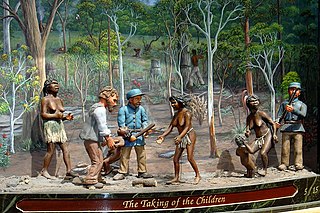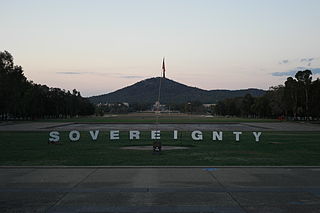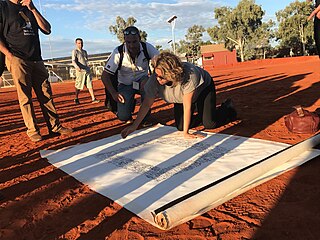
Robert "Robbie" Thorpe is an Aboriginal Australian activist and presenter of Fire First, a program on community radio station 3CR in Melbourne.

Robert "Robbie" Thorpe is an Aboriginal Australian activist and presenter of Fire First, a program on community radio station 3CR in Melbourne.
Thorpe is from the Krautungalung people of the Gunnai Nation [1] and is uncle of Senator Lidia Thorpe. [2] [3]
Thorpe has campaigned for Indigenous solutions in Australia since the 1970s. He is an advocate for Pay The Rent, an Indigenous initiative set up to provide an independent economic resource for Aboriginal peoples, [1] and the Aboriginal Passport initiative. [2]
Inspired by Bruce McGuinness' newspaper The Koorier (1968–1971), Thorpe founded and ran the publication The Koorier 2 [4] during the 1970s and 1980s, [5] and later The Koorier 3, published by the Koori Information Centre. [6]
In 1982, Thorpe challenged the Commonwealth of Australia in a case entitled Thorpe V Commonwealth for not protecting people from crimes connected to genocide. Since 2020, Robbie has been working on a court case to charge the Crown for crimes against humanity. [2]
Robbie initiated the 3CR's Fire First program with Clare Land, after appearing on her Tuesday Breakfast program with his comrade Fantom. Between 2005 and 2006 Fire First supported and fed into the Black GST (Genocide, Sovereignty, Treaty) Collective,. [7] a campaign to end genocide, recognise Australian Aboriginal Sovereignty and make Treaty, that protested at the 2006 Commonwealth Games. [3] In 2006, Fire First presented several live broadcasts and a daily update from Camp Sovereignty. [7]
Thorpe has produced numerous videos to support campaigns and campaigners, including advice videos for pro-Indigenous white activists in Australia with fellow activist Gary Foley. These videos are aimed at non-Indigenous people seeking to act in solidarity with Aboriginal and Torres Strait Islander peoples. [8]
Thorpe's speeches and interviews are frequently captured on news and for activist films and he has starred in hip hop videos and other creative productions. [9]
As of August 2022 [update] Thorpe's own story is being captured in a new documentary film, directed and produced by Anthony Kelly, entitled Our Warrior: The Story of Robbie Thorpe. [10]

The Stolen Generations were the children of Australian Aboriginal and Torres Strait Islander descent who were removed from their families by the Australian federal and state government agencies and church missions, under acts of their respective parliaments. The removals of those referred to as "half-caste" children were conducted in the period between approximately 1905 and 1967, although in some places mixed-race children were still being taken into the 1970s.

Australian Indigenous sovereignty, also recently termed Blak sovereignty, encompasses the various rights claimed by Aboriginal and Torres Strait Islander peoples within Australia. Such rights are said to derive from Indigenous peoples' occupation and ownership of Australia prior to colonisation and through their continuing spiritual connection to land. Indigenous sovereignty is not recognised in the Australian Constitution or under Australian law.

The Aboriginal Tent Embassy is a permanent protest occupation site as a focus for representing the political rights of Aboriginal Australians and Torres Strait Islander people. Established on 26 January 1972, and celebrating its 50th anniversary in 2022, it is the longest continuous protest for Indigenous land rights in the world.
The history wars is a term used in Australia to describe the public debate about the interpretation of the history of the European colonisation of Australia and the development of contemporary Australian society, particularly with regard to their impact on Aboriginal Australian and Torres Strait Islander peoples. The term "history wars" emerged in the late 1990s during the term of the Howard government, and despite efforts by some of Howard's successors, the debate is ongoing, notably reignited in 2016 and 2020.

Camp Sovereignty is the name given to an Aboriginal and Torres Strait Islander protest movement established as part of the "Black GST" political movement. GST stands for ending genocide, acknowledging sovereignty and securing treaty. The camp has existed as two iterations, one in March 2006 and one in January 2024.
Kevin John Gilbert was an Aboriginal Australian author, activist, artist, poet, playwright and printmaker. A Wiradjuri man, Gilbert was born on the banks of the Lachlan River in New South Wales. Gilbert was the first Aboriginal playwright and printmaker. He was an active human rights defender and was involved in the establishment of the Aboriginal Tent Embassy in 1972 as well as various protests to advocate for Aboriginal Australian sovereignty.

Kevin Buzzacott, often referred to as Uncle Kev, was an Aboriginal Australian rights campaigner and elder of the Arabunna nation in northern South Australia. He campaigned widely for cultural recognition, justice, and land rights for Aboriginal people. He initiated and led numerous campaigns, including against uranium mining at Olympic Dam mine on Kokatha land and the exploitation of the water from the Great Artesian Basin. He also published a collections of poetry, which included the content of his keynote address at a 1998 conference.
Indigenous Australians are people with familial heritage from, and/or recognised membership of, the various ethnic groups living within the territory of present day Australia prior to British colonisation. They consist of two distinct groups, which includes many ethnic groups: the Aboriginal Australians of the mainland and many islands, including Tasmania, and the Torres Strait Islanders of the seas between Queensland and Papua New Guinea, located in Melanesia.

Smoking ceremony is an ancient and contemporary custom among some Aboriginal Australians that involves smouldering native plants to produce smoke. This herbal smoke is believed to have both spiritual and physical cleansing properties, as well as the ability to ward off bad spirits. In traditional, spiritual culture, smoking ceremonies have been performed following either childbirth or initiation rites involving circumcision. In contemporary culture, elements of smoking ceremonies have been incorporated into Welcome to Country performances and other spiritual events held for the general public.

The Australian frontier wars were the violent conflicts between Indigenous Australians and primarily British settlers during the colonial period of Australia.
The National Aboriginal Conference (NAC) was a national organisation established by the Australian Government to represent Indigenous Australians, that is Aboriginal Australians and Torres Strait Islander peoples.

The Quandamooka people are Aboriginal Australians who live around Moreton Bay in Southeastern Queensland. They are composed of three distinct tribes, the Nunukul, the Goenpul and the Ngugi, and they live primarily on Moreton and North Stradbroke Islands, that form the eastern side of the bay. Many were pushed out of their lands when the English colonial government established a penal colony near there in 1824. Each group has its own language. A number of local food sources are utilised by the tribes.
Alma Beryl Thorpe is an Australian Aboriginal elder and activist. In 1973 she co-founded the Victorian Aboriginal Health Service (VAHS), together with her mother, Edna Brown, and Bruce McGuinness.

Lidia Alma Thorpe is an Aboriginal Australian independent politician. She has been a senator for Victoria since 2020 and is the first Aboriginal senator from that state. She was a member of the Australian Greens until February 2023 when she quit the party over disagreements concerning the proposed Indigenous Voice to Parliament, and became a leading figure in the "progressive No" campaign for the Voice referendum in October 2023. She had also served as the Greens' deputy leader in the Senate from June to October 2022.

The Uluru Statement from the Heart is a 2017 petition to the people of Australia, written and endorsed by the Australian Aboriginal and Torres Strait Islander leaders selected as delegates to the First Nations National Constitutional Convention. The document calls for substantive constitutional change and structural reform through the creation of two new institutions; a constitutionally protected First Nations Voice and a Makarrata Commission, to oversee agreement-making and truth-telling between governments and First Nations. Such reforms should be implemented, it is argued, both in recognition of the continuing sovereignty of Indigenous peoples and to address structural power differences that has led to severe disparities between Indigenous and non-Indigenous Australians. These reforms can be summarised as Voice, Treaty and Truth.

The Aboriginal and Torres Strait Islander Voice, also known as the Indigenous Voice to Parliament, the First Nations Voice or simply the Voice, was a proposed Australian federal advisory body to comprise Aboriginal and Torres Strait Islander people, to represent the views of Indigenous communities.

The Kings Domain Resting Place is a memorial in Melbourne, Victoria, Australia, located in Kings Domain on Linlithgow Avenue. The site is the resting place for the repatriated and reburied remains of 38 Aboriginal People of Victoria, marked by a memorial plaque embedded in a large granite boulder. It is an Aboriginal heritage site protected by the Melbourne Planning Scheme. The whole area of Melbourne's Domain Parkland and Memorial Precinct, including the site itself was added to the Australian National Heritage List on 11 February 2018.

Dorinda Rose Cox is an Australian politician who has been a Senator for Western Australia since 2021, representing the Greens. A Yamatji and Noongar woman, she is the first Indigenous woman to represent Western Australia in the Senate. She was originally appointed to fill the casual vacancy caused by the resignation of Senator Rachel Siewert in 2021, and was then elected as the Greens' lead Senate candidate in Western Australia at the 2022 federal election.
Bruce Brian McGuinness was an Australian Aboriginal activist. He was active in and led the Victorian Aborigines Advancement League, and is known for founding and running The Koorier, which was the first Aboriginal-initiated national broadsheet newspaper between 1968 and 1971.

The 2023 Australian Indigenous Voice referendum was a constitutional referendum held on 14 October 2023 in which the proposed Aboriginal and Torres Strait Islander Voice was rejected. Voters were asked to approve an alteration to the Australian Constitution that would recognise Indigenous Australians in the document through prescribing a body called the Aboriginal and Torres Strait Islander Voice that would have been able to make representations to Federal Parliament and the executive government on "matters relating to Aboriginal and Torres Strait Islander peoples". The proposal was rejected nationally and by a majority in every state, thus failing to secure the double majority required for amendment by section 128 of the constitution. The Australian Capital Territory was the only state or territory with a majority of "yes" votes. Analysis of surveys following the referendum identified the main reasons why the majority of Australians voted no was a scepticism of rights for some Australians that are not held by others and a fear of constitutional change.